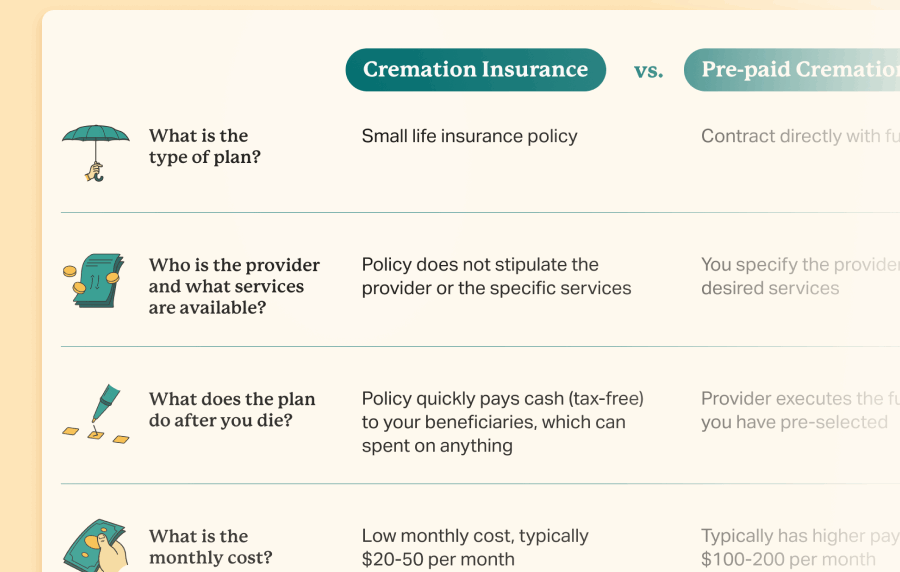Accidental Death Scam
For context, it’s essential to note that accidental death insurance is a specific type of life insurance that only pays out in the event of an accident. It will not pay a death benefit for natural causes such as a heart attack, stroke, or cancer.
The accidental death scam can be done in two ways.
Presenting accidental death only as regular life insurance
An agent or company offers you an accidental death policy but makes you believe it covers you for natural causes of death. This scam is so effective because accident-only coverage is incredibly cheap, and people are highly drawn to the low price (many of whom don’t think to ask questions about why it’s so inexpensive).
Accidental death insurance is so inexpensive (A 50-year-old female can get $250,000 in coverage for $26 per month) because the chance of death from an accident is extremely low, which means the insurance company knows they won’t have to pay a claim 99.9% of the time.
Bundling an accidental death rider with natural coverage to artificially inflate the total coverage
First, an accidental death rider is an add-on to a policy that would double the payout if death is from an accident. It’s very low cost, typically only a few dollars extra per month. The rider is null and void if you don’t die from an accident.
However, you think the whole thing covers you for natural causes of death. They do this to greatly reduce the price, so the unsuspecting customer thinks they’re getting a great bargain. Here’s an example to illustrate how this works. Let’s say the lying agent would charge a woman $150 monthly for $20,000 in natural death coverage. Alternatively, that agent knows that most other final expense companies would charge about $100 for the same thing.
The unscrupulous agent will then sell her a $10,000 natural death policy with a $10,000 accidental death rider, bringing the price down to about $80 monthly. They present the customer with this lower price and tell them, “You’re covered for $20,000.” The customer does not know that a natural cause of death would only yield a $10,000 payout, not $20,000.
Waiting Period Scam
With this scam, an agent or company sells you a burial policy with a waiting period, and they intentionally keep that detail hidden from you.
You think you’re fully insured for natural or accidental death right away. But in reality, if you die in the first 24 months from something other than an accident, your loved ones would only get a refund of your premiums.
If any agent or company offers a policy with a waiting period, they must disclose this to you. Not only are they legally required to, but it’s morally the right thing to do regardless of the legalities. Sadly, some dishonest agents will purposefully omit this detail because they know you will likely reject the policy.
Rate Classification Scam
Here’s some context to review so you can fully understand how this scam works.
Many final expense insurance companies offer coverage with no waiting period. With immediate coverage options, there are typically two to three health ratings you can qualify for. It’s commonplace for companies to use words such as the following to describe their various health ratings: Preferred, Level, Elite, Standard, Select, Graded, and Modified.
Only Preferred, Level, Elite, Standard, and Select plans have no waiting period. For example, the Living Promise policy from Mutual of Omaha has two options- Level and Graded. Only their level plan has no waiting period. On the other hand, an Aetna life insurance policy has three options- Preferred, Standard, and Modified. Only their Preferred and Standard options have no waiting period.
That all said, here’s how this scam is executed.
The dishonest agent submits your application to the insurance company at the agreed-upon coverage amount and price. Then, due to your medical history, the company is only willing to approve you at a different rate classification, which carries a higher price and, in some cases, a waiting period as well.
The insurance company relies on the agent to speak with you to determine how you would like to proceed. When this happens, you generally have a few options:
- Accept the higher price and waiting period (if applicable).
- Keep the premium the same, but reduce the death benefit.
- Cancel the application.
The scamming agent never communicates any of this information to you. They just tell you you’re approved.
Then, to mask their deception, the agent instructs the insurance company to maintain the current premium and reduce the death benefit. They do that so you see the price on your bank statement you were expecting, which makes you think everything is in good order. The scamming agent knows that very few people actually read the policy, which is the only way to know the truth.
You think you were approved for what was initially discussed. However, in reality, the coverage is lower, and there may be a waiting period (which there usually is when this happens).
Here’s a real-world example of how this scenario could unfold. Let’s say a 54-year-old male applies for a $10,000 policy with Mutual of Omaha. The level price (no waiting period) would be $34.24 monthly, and the graded price would be $42.76 (with a two-year waiting period).
If Mutual of Omaha finds a medical condition that causes them to only offer the graded option, they will ask the agent to inform them of how the client would like to proceed. The agent should present the client with these three options:
- Keep the coverage at $10,000 and accept the higher price of $42.76, along with a waiting period.
- Reduce the coverage to $7,956, keep the premium at $34.24, along with a waiting period.
- Withdraw the application.
If the agent advises Mutual of Omaha to select option number 2, the client would only know if they reviewed their policy (which virtually nobody does).
Health Assessment Scam
When applying for a no waiting period final expense policy for seniors, you must answer health questions. Additionally, the insurance company will access (with your permission) medical databases that show which medications you’ve been prescribed and various diagnoses.
Remember that you are not the one who marks the answers to the various health questions. Whether the application is completed in person with a wet signature, verbally, or via electronic means, the agent is the only one who marks ‘yes’ or ‘no’ to each question.
With the health assessment scam, the agent will inaccurately answer no to a health question(s) you actually said yes to. They do this because they know that if they mark ‘yes’ to a question, it will result in either A) a higher price or B) a higher price and a waiting period. They know an increase in premium means you’re less likely to proceed. They don’t want to lose a commission, so they knowingly mark the answer as no.
It’s critical to remember that all types of life insurance for seniors with no waiting period contain the Incontestability Clause A clause in a life insurance policy that limits the time an insurance company has the right to investigate a death claim before payout of the death benefit. In most states, this clause is limited to two years; however, some states limit it to one year. Any death within the contestability will 100% cause the insurer to order all your medical records to ensure you correctly answered all the health and lifestyle questions when you originally applied. Only after they investigate the claim will they pay out or deny the death benefit. . This clause grants the insurer the right to investigate any claim within the first two years of the policy’s effective date.
Essentially, they will order your medical records to ensure you answered the health questions correctly. If they find evidence of a health condition asked about on the application that existed when you applied, they will not pay out your claim. They would only refund your premiums.
So when agents do this, they rob clients of a policy that would pay out for death in the first two years. For the insurance company, the compelling factor is that you should never have qualified in the first place. The reality that your agent lied to you does not override the fact that you would have been denied had the insurer known the truth about your health history.
In fact, the insurer has no way of knowing that the agent lied. They are a victim just as much as you are.
Phrasing Scam
The phrasing scam occurs when an agent or company deliberately misuses words and omits context to confuse or mislead you. There are generally two popular phrases they use to execute this scam.
- “Effective date”: For context, the effective date of a policy is merely its birthday. It’s the day the policy’s terms and conditions become active. If you have a policy with a two-year waiting period, the two-year countdown starts on the effective date. FYI, the effective date of a policy is determined by the date you make the first payment. You must understand that a policy being “effective” doesn’t waive its terms and conditions. It simply means the terms and conditions of the policy have taken effect. Here’s an example of how this plays out in the real world. The scamming agent will say something like, “Great news- you’ve been approved, and your policy is in full effect as of today .”They also intentionally don’t mention that the policy has a waiting period. But when most people hear “effective as of today,” they think they’re fully covered for natural or accidental death, which is obviously untrue in this example. All policies with or without a waiting period (or any other provision) have an effective date.
- “Covered”: With this one, the scamming agent is selling a policy with a waiting period. They proclaim that you’re “covered as of today .”That is not technically an outright lie because policies with waiting periods still fully cover you for accidental death (even in the first two years). But they know that when they say “fully covered,” nearly everyone will assume they are insured for natural or accidental death. If that agent were honest, they would say, “You were approved, but the policy has a two waiting period. You’re only covered for accidental death. Only after two years will you be insured for natural causes of death too”.
How To Avoid All Scams
Whether it’s a funeral scam or a burial insurance scam, there are practical steps you can take to protect yourself from such scams. Understand that scammers don’t want to be caught on a recorded line lying to you. Instead, they much prefer to lie via omission. Their leaving out critical details allows them to deny allegations levied against them.
The first step to protecting yourself is to answer many questions up front before signing on the dotted line. Ask questions such as:
- Does the premium ever increase?
- Will the policy expire at any age?
- Is there a full or partial waiting period during the first few years for natural causes of death?
- Can the coverage ever decrease?
- Does the policy only cover me for accidental death?
Now, as vital as it is to ask questions upfront, it’s far more critical that you read your policy once it arrives. Everything you see or hear outside the policy is legally irrelevant and nonbinding. The policy is the legal contract between you and the insurance company, and it’s the only thing that matters.
You must open it up to verify the premium, the death benefit, if there is a waiting period, and everything else. You must also review the application. Every life insurance policy will include a copy of the application. Ensure you inspect how the health questions were answered to validate that your correct answers were recorded.
If you find any discrepancies or concerns, call the insurer immediately. You can cancel any form of insurance at any time. Additionally, if you’ve already made your first premium payment, you will receive a refund if you cancel the policy within the first 30 days.
If you take these steps, none of the scams above (or others) will ever work against you.
If You Need Final Expense Insurance, Choice Mutual Can Help
Sadly, the final expense insurance business has a decent share of bad apples that will try to take advantage of you somehow.
If you need a final expense policy, call Choice Mutual. We specialize in burial insurance for seniors; you can trust that we will be honest and partial to you.
Here’s why you should work with us:
- There are thousands of reviews online from happy customers
- We partner with over 20 insurance companies to find the best policy at the lowest price.
- Burial life insurance is our specialty.
- Our agents are friendly, will answer all your questions, are never pushy, and allow you to choose when and if you buy a policy.
Call us at 1-800-644-2926 or use our quoting tool to get started.
Frequently Asked Questions
To avoid final expense insurance scams, you must ask various targeted questions upfront to discover critical details that an agent may be hiding from you. Most of all, you must read your policy once you get it. You need to verify the premium you’ll pay and whether it will increase as you age. Also, confirm how much coverage you’re insured for, if there is a waiting period, and if the policy will expire or last forever.
Around age 40-50, companies that sell life insurance for seniors, medical supplies, and many other products or services will begin emailing you advertisements to buy burial insurance, health insurance, diabetic supplies, and dozens of other goods targeting older adults. Unsubscribing from their list is the only way to mitigate these unwanted emails.
Dave Ramsey has not publicly commented on whether or not a person should buy burial insurance. However, Dave has gone on record for most of his career, stating that you should only buy term life insurance. His advice lacks nuance and shouldn’t be applied without speaking to an experienced agent who can advise you appropriately. If you need life insurance to cover your burial expenses, buying a term life policy is a big gamble. Term life policies usually expire around age 80, which most people exceed. So if you purchase term insurance to save money and live beyond age 80, you’d have no insurance to cover your burial. Always get whole life funeral insurance if you need a policy to pay your final expenses.
State regulated life insurance is a terribly deceptive form of marketing insurance companies, and agents use to trick you into thinking you can get government-backed life insurance at little or no cost. The truth is, you’re being offered life insurance, and it’s not special, unique, or exclusive to people in your state. It’s not backed or endorsed by any federal, state, or local government. If you respond to one of these advertisements, expect life insurance agents to show up at your door to sell you a policy.
The only time the government pays for funeral costs is for veterans. If you served in the military, you’re entitled to various burial benefits at no cost to you. For everyone else, there is no free government final expense insurance program that will pay for end-of-life costs. The only money the government pays after someone dies is a $255 survivorship benefit from Social Security.
- Nationally licensed life insurance agent with over 16 years of experience
- Personal annual production that puts him in the top .001% out of all life insurance agents in the nation.
Anthony Martin is a nationally licensed insurance expert with over 16 years of experience and has personally served over 10,000 clients with their life insurance needs. He frequently authors entrepreneurial and life insurance content for Forbes, Inc.com, Newsweek, Kiplinger, and Entreprenuer.com. Anthony has been consulted as an expert life insurance source for dozens of high-profile websites such as Forbes, Bankrate, Reuters, Fox Business, CNBC, Investopedia, Insurance.com, Yahoo Finance, and many more.
- Nationally licensed life insurance agent with over 20 years of experience
- Best selling Amazon author.
Jeff Root is a nationally licensed life insurance expert with over 20 years of experience. He has personally helped over 3000 clients with their life insurance needs. Jeff is a best-selling Amazon author and the managing partner of a highly successful insurance brokerage that manages over 2,500 licensed insurance agents across the USA. He has been a featured life insurance source for prestigious websites such as Forbes, Bloomberg, MarketWatch, Nerdwallet, and many more.
- Nationally licensed life insurance agent with over 15 years of experience
- Best selling Amazon author of five insurance sales books.
David Duford is a nationally licensed insurance expert with over 15 years of experience. He has personally helped more than 15,000 clients buy life insurance. David has been featured as an expert source for highly authoritative publications such as A.M. Best and Insurancenewsnet. He also runs one of the largest Youtube channels to help aspiring insurance agents serve their clients better.
- Nationally licensed life insurance agent with over 20 years of experience
- Best selling Amazon author.
Jeff Root is a nationally licensed life insurance expert with over 20 years of experience. He has personally helped over 3000 clients with their life insurance needs. Jeff is a best-selling Amazon author and the managing partner of a highly successful insurance brokerage that manages over 2,500 licensed insurance agents across the USA. He has been a featured life insurance source for prestigious websites such as Forbes, Bloomberg, MarketWatch, Nerdwallet, and many more.
- Nationally licensed life insurance agent with over 15 years of experience
- Best selling Amazon author of five insurance sales books.
David Duford is a nationally licensed insurance expert with over 15 years of experience. He has personally helped more than 15,000 clients buy life insurance. David has been featured as an expert source for highly authoritative publications such as A.M. Best and Insurancenewsnet. He also runs one of the largest Youtube channels to help aspiring insurance agents serve their clients better.
Choice Mutual often cites third-party websites to provide context and verification for specific claims made in our work. We only link to authoritative websites that provide accurate information. You can learn more about our editorial standards, which guide our mission of delivering factual and impartial content.
-
accidental death insurance. https://www.investopedia.com/terms/a/accidental-death-dismemberment-insurance.asp
-
accidental death rider. https://www.investopedia.com/terms/a/accidental-death-benefit.asp
-
Social Security. https://www.ssa.gov/benefits/survivors/ifyou.html








